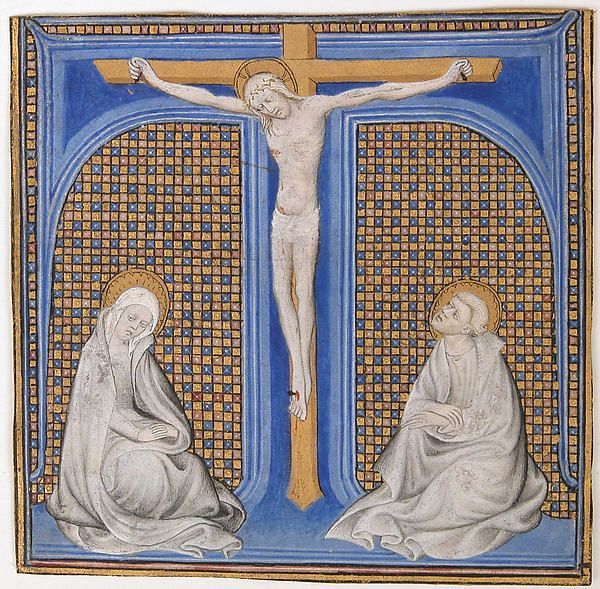Contemplation to Attain the Love of God
The contemplation for obtaining love, though placed outside the Fourth week, is the crowning point of the Spiritual Exercises.
Heaven is the home of love: of the eternal Love that is God himself, and of the created love poured by God into his creatures. Earthly love is a preparation for it, or better, its beginning.
In this contemplation Saint Ignatius emphasizes two aspects:
The first aspect, is that love ought to show itself in deeds rather than in words.” It is an echo of the teaching of the Beloved Disciple: “My little children let us not love in word, nor in tongue, but in deed and in truth.” (1 John 3, 18)
The second aspect that love consists in mutual interchange of gifts between the lover and the beloved
Composition of place: it is to see how I stand before God our Lord, before the angels and saints who are interceding for me.
Prayer of petition: it is to ask for an interior knowledge of so many favors that I have received, so that acknowledging them to the full, I may be able to love and serve His Divine Majesty in everything.
Creation and Conservation
God is love.
How can we show this reality? We can contemplate this reality in the creation and conservation of things. (Question 20, article 2)
Saint Thomas Aquinas says, that God loves all existing things.
For all existing things, in so far as they exist, are good, since the existence of a thing is itself a good. God’s will is the cause of all things.
Then a thing has existence, or any kind of good, only because it is willed by God. So, we can say that to every existing thing God wills some good.
Now, to love anything is nothing else than to will good to that thing, it is manifest that God loves everything that exists.
Yet not as we love. Because since our will is not the cause of the goodness of things, but is moved by it as by its object, our love, whereby we will good to anything, is not the cause of its goodness;
On the contrary, the love of God creates goodness.
Through love He has created us. Then we can say that creation is the overflowing of the love of God on to his creatures.
Psalm 150 says: “Let everything that lives and that breathes give praise to the Lord.”
Commenting on this psalm the Saint John Paul II says that “praise of God becomes like the breath of the soul…praise becomes the profession of faith in God the Creator and the Redeemer… praise becomes the feast of the Divine Love…”
The whole creation is a hymn of praise: sun and stars, sky and earth, mountains, seas and rivers, living creatures and human beings. The whole creation should be a hymn of praise to the Creator, but the primacy in this choir is reserved to the human being.
It is through the human being that all living creature praises the Lord. It is because we can see the work of God and we can contemplate his Majesty in this work. Saint Paul says: “what can be known about God is evident… and God made it evident… Ever since the creation of the world, his invisible attributes of eternal power and divinity have been able to be understood and perceived in what he has made…” (Rom 1: 19)
And in this contemplation, we can give praise and we have to give praise. Then our breath of life will become a song and prayer, where the whole universe will be included.
Sun and moon, stars of heaven, every shower and dew, fire and heat, nights and days, mountains and hills, all you birds of the earth, all you beast wild and tame, you sons of men…Praise and exalt God.
Redemption, Sanctification and Glorification
We can remember the great works of our Lord. Bethlehem, Calvary, and the Altar show how God has fulfilled the law of love. In Bethlehem He gave Himself to us: “To you a Savior is born.” On Calvary He shed the very last drop of His blood for us: “And walk in love, as Christ loved us and gave himself up for us, a fragrant offering and sacrifice to God.” (Ephesians 5: 2) and on the altar He gives and sacrifices himself for each one of us, every minute of the day. Think in the thousand of Masses that in the World are celebrated every day. Probably his words this is my body, this is my blood… are repeated at every minute around the whole world.
In Christ and through Christ, God has made us partakers of his very life. Saint Peter says, “He has given us his precious and very great promises, that through these you may … become partakers of the divine nature.” (2 Pt 1: 4)
Christ our Lord has established the Church to teach us his Sacred Doctrine, to sanctify us and guide us.
We can remember the gift of his Mother, her maternal protection in our entire life: The gift of all the saints, Apostles and Martyrs, Holy pastors of the church, Doctors, Virgins, holy men and women.
We can think in the example of holy people; we can think in the person of the Pope. The grace to live during the time of our John Paul II, a giant, in his works, writings, trips…
With these supernatural gifts, we can see how God truly is the Heavenly Father, who with outstretched arms, calls to Himself the soul which He has created according to his Divine Providence.
Individual God’s Gifts
Besides all these natural and supernatural gifts –the creation and preservation of the Universe; the redemption and sanctification of souls, God loves me individually. For the least of us He would have created the world, He would have become man, and would have died on the Cross.
He loved me –Saint Paul would repeat – and delivered himself up for me.
Each one of us knows perfectly how this love of God has worked within us.
Suscipe Domine
This is our answer, this is our final prayer, and could be our entire contemplation.
Take, O Lord, and received all my liberty, my memory, my understanding, and my entire will, all that I have and possess. You have given all to me. To you, O Lord, I return it. All is yours. Dispose of it wholly according to your will. Give me your love and your grace, for this is sufficient for me.

Take, Lord,
and receive all my liberty, my memory, my understanding, and my entire will, all that I have and possess. Thou hast given all to me. To Thee, O Lord, I return it. All is Thine, dispose of it wholly according to Thy will. Give me Thy love and Thy grace, for this is sufficient for me.
(Spiritual Exercises #234. Louis Puhl SJ, Translation.)


